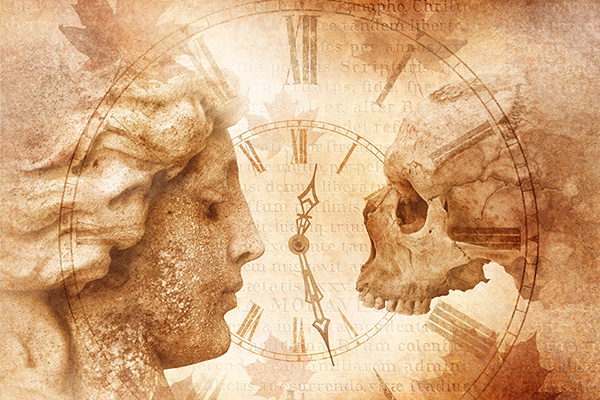What If There Is No Tomorrow?
 A sense of anguish sometimes strikes us while we are experiencing something good in our life. In the midst of the delightful feelings of happiness and joy, we grimly remind ourselves that we must enjoy it while it lasts, because all good things come to an end.
A sense of anguish sometimes strikes us while we are experiencing something good in our life. In the midst of the delightful feelings of happiness and joy, we grimly remind ourselves that we must enjoy it while it lasts, because all good things come to an end.
Yes, everything does come to an end, right up to our own passing from this world to the next. Yes…our inevitable death. Thinking about this can be sad and depressing, but it also not… if we choose otherwise.
There is an ancient philosophy of reflecting on one’s mortality known as memento mori, which in Latin means ‘remember death.’ This profound saying does not only serve to remind us of that our death is inevitable, but also invites us to think about death in a more meaningful way.
In Stoicism, a school of ancient Greek philosophy, memento mori was seen to be a thought process to attribute deeper meaning to life. The philosopher Epictetus famously said, “Keep death and exile before your eyes every day, with all that seems terrible – by doing this, you will never have a base thought, nor an excessive desire.”
Although the notion of memento mori seems at first scary, sad, or tragic, it is in truth a reminder that everything and everyone will eventually come to an end. The moment we sensibly embrace this universal truth, we become so much more aware of how precious every moment of our life is. And ideally it then inspires us to live more fully and intensely, without wasting any more time on trivial things and petty issues.
Do not act as if you were going to live ten thousand years. Death hangs over you. While you live, and while it is in your power, be good ~ Marcus Aurelius
Thinking about endings and death is not something we do much of in our modern culture. The ancients were much more in touch with the natural cycles of life, and the passing of time. They understood the impermanence of life.
Today, the notion of death is mostly associated with pain, grief, tragedy, and suffering. It is also an ‘unpleasant’ and even ‘inconvenient’ matter we prefer to not deal with unless absolutely necessary. We even avoid saying the word ‘death’ as much as possible.
But when we begin to honestly think about death – not how or when we’re going to die, but the fact that we are eventually going to die – that fear that we attached to this inevitable fact of life begins to break down.
What harm is there, while you kiss your child, in saying softly, ‘tomorrow you may die’; and so to your friend, ‘tomorrow either you or I may go away, and we may see each other no more’ ~ Epictetus
Our first aim in life should be to understand that we are eternal spirit beings in temporary human bodies. The second, to realize that we already have everything we need to pursue our dreams and desires and fulfill our purpose. Thirdly, we must accept that all things in this material world will end, including our current lifetime. And finally, we must focus only on enjoying every day and live in the fullness of the present moment. Then all the other trivialities of your days will go unnoticed, and death loses much of its fear factor.
If there was no tomorrow, what would you do today, right now?
Focus on what makes you really happy. Devote yourself to building a meaningful legacy. Spread as much kindness and love as you can. Enjoy every blessing in your life, big or small (we always have much to be grateful for). And most of all…live your best life. Memento mori.
|
|

Leave a Reply